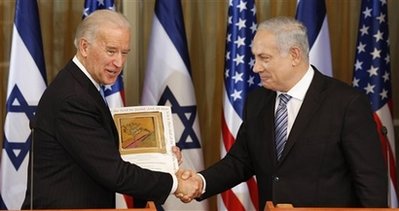Global General
Israel OKs 1,600 new homes in east Jerusalem
(Agencies)
Updated: 2010-03-10 04:46
 |
Large Medium Small |
JERUSALEM - Israel approved the construction of 1,600 new homes for Jews in disputed east Jerusalem on Tuesday - a move that immediately clouded a visit by Vice President Joe Biden aimed at repairing strained ties and kickstarting Mideast peace talks.
The Interior Ministry announced the construction plans just as Biden was wrapping up a series of warm meetings with Israeli leaders. There was no immediate reaction from the vice president.
|
 US Vice President Joe Biden, left, shakes hand with Israel's Prime Minister Benjamin Netanyahu at the Prime Minister's residence in Jerusalem, Tuesday, March 9, 2010. Biden said there is a 'moment of opportunity' for peace between Israelis and Palestinians. [Agencies] |
Relations between Israel and the Obama administration have been chilly precisely because of the settlement issue.
The US, like the Palestinians and the rest of the international community, believes that Israeli settlements built on lands claimed by the Palestinians, including east Jerusalem, undermine peace prospects. President Obama has been more outspoken on the issue than his predecessors.
Israel captured both areas in the 1967 Mideast war and subsequently annexed east Jerusalem. Israel considers its east Jerusalem neighborhoods to be part of its undivided capital, but the annexation has never been internationally recognized and the neighborhoods are widely seen as settlements.
Interior Ministry spokeswoman Efrat Orbach said the new homes would be built in Ramat Shlomo, an existing neighborhood for ultra-Orthodox Jews. She noted that there is a 60-day appeals period, indicating that the decision could yet be changed.
But Palestinian negotiator Saeb Erekat said the move was destroying trust needed to go forward with the new round of indirect peace talks, which the two sides agreed this week would take place under the mediation of US envoy George Mitchell. Peace efforts have been stalled for 14 months, in large part because of Palestinian anger over settlement activity.
"With such an announcement, how can you build trust? This is destroying our efforts to work with Mr. Mitchell," Erekat said. "It's a really disastrous situation. I hope that this will be an eye-opener for all in the international community about the need to have the Israeli government stop such futile exercises."
The announcement threatened to embarrass Biden, whose visit is aimed largely at repairing the relationship with Israel. Biden's public comments throughout the day had clearly been meant to calm Israeli concerns that Obama has been less friendly to the country than past US leaders.
The move also may have been the result of internal politics. A spokesman for Netanyahu said he was unaware of the announcement, raising the possibility that the Interior Ministry - run by a hardline religious party - had not coordinated the news with the Israeli leader or had even tried to embarrass him.
Interior Minister Eli Yishai's office issued a statement saying Tuesday's decision was a procedural step in a long process. "The timing ... has no connection to the US vice president's visit to Israel," it said.
Earlier in the day, Biden made no mention of the settlement dispute as he assured Israelis they can count on strong US backing as peace efforts finally resume. The resumption of talks, albeit indirect, is the first concrete achievement for Obama in the Israeli-Palestinian arena.
The relationship between the two allies, Biden told reporters as he stood beside Netanyahu, has always been a "centerpiece of American policy."
"Progress occurs in the Middle East when everyone knows there is simply no space between the United States and Israel," Biden said.
"The United States will always stand with those who take risks for peace," Biden said, telling Netanyahu, "you're prepared to do that."
Obama began his term with a push for Mideast peace, prodding Israel to freeze its construction of West Bank settlements that swallow up land the Palestinians want for a future state.
The insistence on a total settlement freeze is seen by many in the region to have backfired. Polls show that Israelis have largely come to see Obama as overly sympathetic to Israel's enemies, making it difficult for the administration to get Israeli public opinion behind any difficult peace moves.
Biden offered assurances that the US remained committed to Israel's security. Iran appeared to loom large in Biden's discussions with Netanyahu. "We are determined to prevent Iran from acquiring nuclear weapons," he said.
Israel has been pushing for stricter international sanctions targeting Iran's nuclear program, and has refused to rule out a military strike if sanctions fail.










